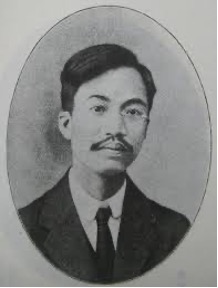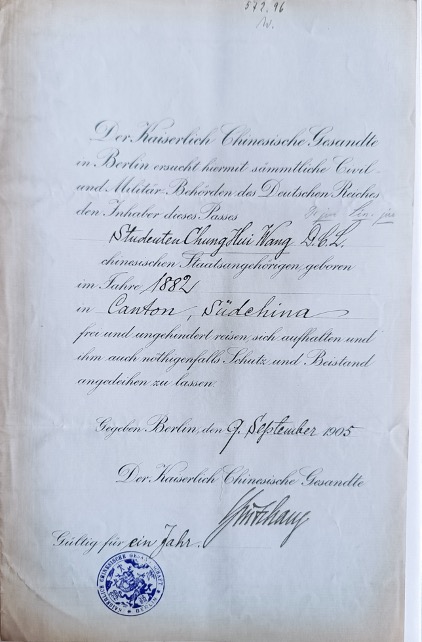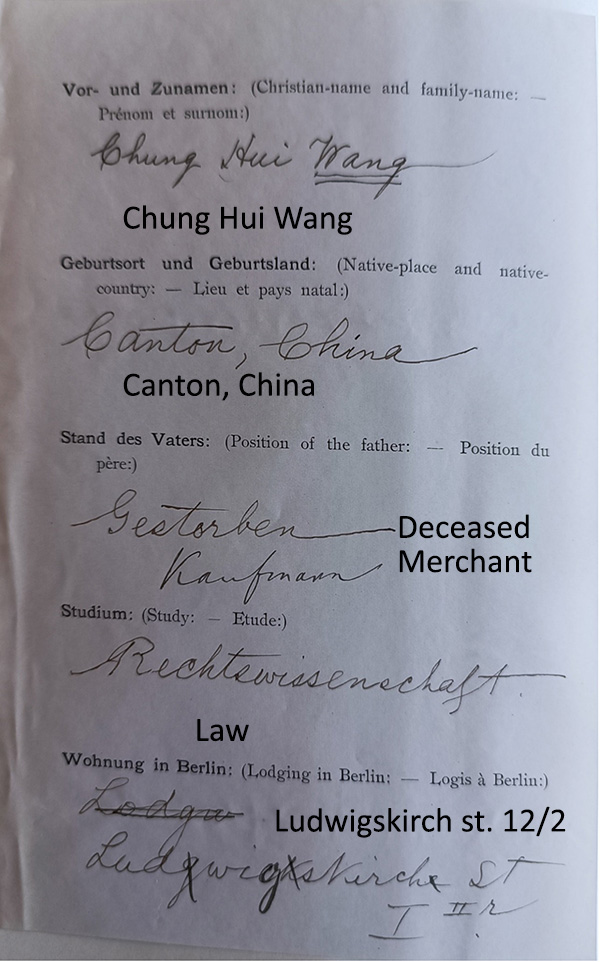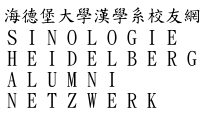An Encounter after a Century: My Interesting Karma with Former ROC Foreign Minister Wang Chonghui

During my visit to the Humboldt University archive on June 8th, I coincidentally discovered the original visa document belonging to Wang Chonghui 王寵惠 (1881-1958), a prominent jurist and politician in Republican China. I have transcribed Wang's original German documents from cursive writing into print form and translated them into English. This article provides a brief introduction to Wang's life and discusses several anecdotes found within his documents.
Born in Hong Kong in 1881, Wang graduated from National Peiyang University in 1900 with a first-class diploma in law, becoming the first person in China to receive a modern diploma from a domestic university. Wang then sought law studies overseas and studied in Japan, the United States, England, and Germany. In 1904, Wang met Dr. Sun Yat-sen and soon became a close member of his entourage, serving as his English speechwriter. Shortly after the Xinhai Revolution, Wang returned to China in 1911 and became the first Foreign Minister of the Beiyang government in 1912. When Chiang Kai-shek established the Nanjing government in 1928, Wang was entrusted and appointed by Chiang as the first President of the Judicial Yuan. In 1943, Wang also accompanied Chiang to the Cairo Conference. After the Chinese Civil War, Wang relocated to Taiwan in 1949 and passed away in 1958.
The first interesting detail that caught my attention was the "D.C.L" title on Wang's visa document (Photo 2), which stands for "Doctor of Civil Law." In fact, prior to applying for his student visa in Berlin in September 1905, he had recently obtained his Doctor of Law degree at Yale earlier that year, becoming the first Chinese to receive this distinction in the university's history. While in Berlin, Wang focused on studying German civil law, and his ambition exceeded expectations. In 1907, he published the first English translation of the "German Civil Code" in London and was called to the bar at Middle Temple. In 1923, Wang's legal career reached further heights when he was nominated as a judge of the Permanent Court of International Justice in The Hague.
Another anecdote concerns the authority that issued Wang's visa (Photo 2). Wang‘s visa was issued by the Qing court upon his arrival in Germany in 1905, merely six years before the 1911 Revolution. In the lower left corner of Wang's visa, one can observe an official stamp from the Imperial Chinese Embassy in Berlin (Kaiserlich Chinesische Gesandtschaft Berlin), adorned with the corresponding Chinese characters "大清使館" encircling the emblem of the Chinese dragon. Interestingly enough, Wang's visa was only valid for a year (Gültig für ein Jahr) and was issued by Ambassador Yinchang, a Manchurian aristocrat who could hardly have foreseen that this 23-year-old young man would later become an influential revolutionary, playing a crutial role in the emerging republican political arena a few years later.
The last "must-mention" anecdote is Wang's lie about his father's occupation. On the second page of Wang's visa document (Photo 3), he claimed that his father was a merchant (Kaufmann). However, Wang's father, Wang Yuchu, was actually an evangelical pastor who initially studied at the church school run by German missionary Ferdinand Genähr, later becoming a missionary of the Rhenish Missionary Society. Although Wang's motive for concealing his father's career remains unclear, his Christian family background connected with German missionaries could be strong evidence explaining his hidden proficiency in the German language.
Current studies on Wang Chonghui mostly focus on Wang's political influence during the republican era, with the majority of them being in Chinese. I hope that more attention can be given to studying Wang's early years' experiences. By doing so, we can gain a better understanding of his unspecified social networks in Hong Kong and overseas, and uncover the "pre-formed" political alliances and emerging constellations among Chinese elites before their return to China in the early 20th century.

Transcript:
Der Kaiserlich Chinesische Gesandte in Berlin ersucht hiermit sämmtliche Civil und Militär.Behörden des Deutschen Reiches den Inhaber dieses Passes
Studenten Chung Hui Wang D. C. L. (Doctor of Civil Law)
chinesischen Staatsangehörigen, geboren
im Jahre 1882 in Canton, Südchina
frei und ungehindert reisen, sich aufhalten und ihm auch nöthigenfalls Schutz und Beistand angedeihen zu lassen.
Gegeben Berlin, den 9. September 1905
Der Kaiserlich Chinesische Gesandte
Yinchang
Gültig für ein Jahr.
Kaiserlich Chinesische Gesandtschaft Berlin 大清使館 (Amtsstempel)
English translation:
The Imperial Chinese Envoy in Berlin herewith requests all civil and military authorities of the German Empire to send the holder of this passport
Student Chung Hui Wang D. C. L. (Doctor of Civil Law)
Chinese national, born
in the year 1882 in Canton, South China
to travel freely and without hindrance, to reside, and if necessary, to provide him with protection and assistance.
Given Berlin, September 9, 1905
The Imperial Chinese Envoy
Yinchang
Valid for one year.
Imperial Chinese Embassy Berlin 大清使館 (Official Stamp)

Chen Tong HUI
Interesting References
1. Wang Yuchu: http://bdcconline.net/zh-hant/stories/wang-yuchu
2. Wang’s translation of the German Civil Code: https://katalog.ub.uni-heidelberg.de/cgi-bin/titel.cgi?katkey=66776738&sess=75b4492c49445e75bb0e6598eaad41c4&art=f&kat1=freitext&kat2=ti&kat3=au&op1=AND&op2=AND&var1=The%20German%20Civil%20Code%2C%20Translated%20and%20Annotated%2C%20with%20an%20Historical%20Introduction%20and%20Appendices.&var2=&var3=#ex

